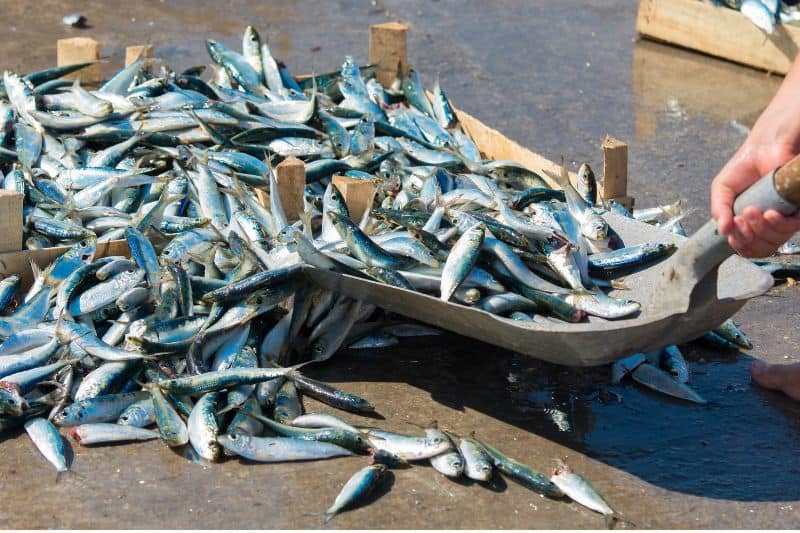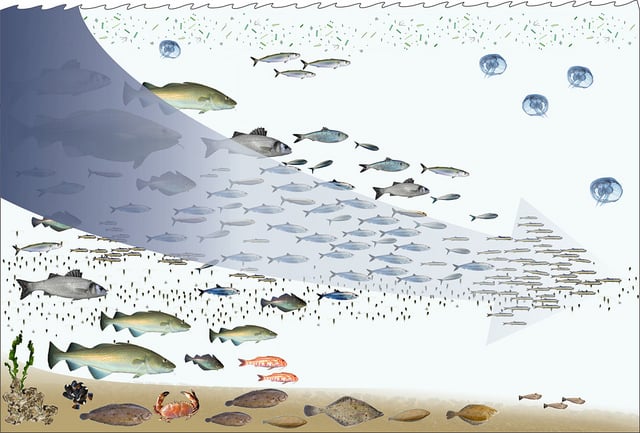Our world is a unique environment in that every living being, plant, and landscape contributes to the overall wellness of the Earth. This is why the harmful effects of human waste, production, and consumption can drastically affect particular ecologies and biospheres.
A major concern right now is the problem of overfishing. Ocean overfishing refers to the unsustainable practice of capturing fish from the sea at excessively high rates, leading to the depletion of fish stocks to a point where they cannot replenish themselves.
With oceans taking up over 70% of the earth, sea creatures and the overall health of marine life is essential for sustaining life elsewhere on the planet, but overfishing is having drastic effects on the future of both ocean and land dwellers.
If you’re overfishing at the top of the food chain, and acidifying the ocean at the bottom, you’re creating a squeeze that could conceivably collapse the whole system.
~ Carl Safina
WWF defines Overfishing as,
“Overfishing occurs when more fish are caught than the population can replace through natural reproduction. Gathering as many fish as possible may seem profitable, but overfishing has serious consequences. The results not only affect the balance of life in the oceans, but also the social and economic well-being of the coastal communities who depend on fish for their way of life.“
Millions of people depend on fishing for their livelihood, and billions of people rely on fish as their crucial source of protein. With increased overfishing practices and without sustainable management, many fish stocks are reduced to below acceptable levels.
Causes of Overfishing
Put simply, overfishing occurs when more fish are caught than can naturally reproduce to repopulate. Because fishing has long been an industry used by humans, there are a number of reasons why it is a problem today.

Some of the causes of overfishing include:
- Difficulties in regulating fishing areas due to lack of resources and tracking activity.
- Most areas in the world totally lack oversight of their fishing industry, which means the practices and activities of fishing fleets are not or barely monitored.
- In international waters, there are little to no rules regarding fishing practices, which means fishing fleets can bypass areas that do have regulations.
- Lack of knowledge regarding fish populations and quotas in a universal standard.
- Problems with customs and importation where the provenance of fish is not questioned, leading to surreptitious practices such as calling one kind of fish something else.
- Unreported fishing, which is nearly impossible to track.
- Many countries have subsidies for fishermen, which keeps their number higher than it needs to be.
- Fishing areas are largely unprotected – only a little over 1.5% of oceans have been declared protective areas, and most of these are still open to fishermen. This means that areas can be harmed or depleted.
Effects of Overfishing
Current estimates are that overfishing has impacted over 85% of the world’s fish resources and that most fisheries are fished far beyond their sustainable capacity. While this is poised to have long-term effects on human consumption, there are also a number of other effects, such as:
1. Removal of Essential Predators
Sharks and tuna are particularly susceptible to overfishing, and when they are removed from the areas they live in, this means that sea creatures further down the food chain are negatively impacted.
Populations can grow larger, and the role that these larger creatures play – from what they eat to how their bodies decompose – mean potentially fatal effects for ocean ecosystems.
2. Poor Coral Reef Health
With a larger amount of smaller marine creatures comes greater damage to coral reefs and other elements of the ocean’s ecosystem. Reefs are essential to ocean life, and once they are harmed, it is hard to repair the damage, if at all.
3. Growth of Algae
In controlled amounts, algae is essential to helping marine life thrive, but if allowed to grow at will, it can impact fish, reefs, and more, leading to severe destruction.
4. Unintended Catches
Another concern of overfishing is that because the industry is so large, many sea creatures get caught in the process but don’t get used for food. This can mean everything from dolphins to turtles can be impacted by the presence of fishing fleets.
5. The Threat to Local Food Sources
There are a number of communities around the world that rely on fish as their primary resource for food. The growth of overfishing has caused a significant threat to these communities, which are often located in developing countries. Without the ability to catch their food, their populations are threatened.
6. Financial Losses
A lot of these communities that rely on fish for food also rely on low-level fishing industries for economic viability. These enterprises, as opposed to large-scale fishing ones, typically do far less damage to their marine life because they are on a much smaller scale.

However, when these communities can’t access food or financial support, they will likely have trouble in the future.
7. An Utter Imbalance of the Marine Ecosystems
As mentioned earlier, overfishing has a profound and detrimental impact on marine ecosystems. This unsustainable practice disrupts the delicate balance within the ecosystem, leading to adverse consequences for both lower and upper trophic levels.
The depletion of certain fish populations disrupts the food chain, affecting the abundance and distribution of other species. This cascading effect can result in reduced biodiversity, altered predator-prey dynamics, and even ecosystem collapse in severe cases.
8. The Targeted Fish and its Harvest
The demand for fish increases with an increase in the population. Also, as it happens, a few species of fish have a higher demand than others. This makes them the targeted fish species.
While it serves the economy well, it is because of the targeted fish that the marine ecological systems suffer a lot. Unchecked and unregulated harvest of the targeted species can render the waterbody “fruitless” due to this lack of ecological balance.
9. Rise of the Endangered Species
We must remember that with the rise of the targeted species, another category of species grows too. These are the untargeted species that soon turn into endangered species.
This happens because of the prevailing ecological imbalance and also because proper efforts are not put in place to increase their population in a waterbody.
10. Improper Aquaculture
To reinforce proper ecological balance in the water bodies, it is essential that the fisheries are equipped with not just the proper instruments but also the proper scientific knowledge to be able to practice proper aquaculture. Due to a lack of proper scientific knowledge, aquaculture practices are vastly improper.
Undoubtedly, one of the significant concerns associated with overfishing is the detrimental impact on regions that depend on thriving marine ecosystems. Regrettably, this problem is pervasive and has far-reaching consequences, affecting every corner of the globe.
Some of the areas that are greatly impacted by overfishing include:
- The Arctic
- Coastal East Africa
- The Coral Triangle (comprised of waters off of Indonesia, the Philippines, Malaysia, Papua New Guinea, the Solomon Islands, and Timor Leste)
- Gulf of California
- Mesoamerican Reef (off the coasts of Belize, Mexico, Honduras, and Guatemala)
- Southern Chile
- The Galapagos
Another major effect of overfishing is the long-term survival of some of the world’s fish species, including:
- Bigeye tuna
- Bluefin tuna
- Skipjack tuna
- Yellowfin tuna
- Albacore tuna
- Abelone (from Japan and China)
- Atlantic and Pacific cod
- Atlantic Halibut
- Spiny lobster (from the Caribbean area)
- Mahi Mahi (from central to south America)
- Orange roughy
- Atlantic sardines
- Nearly 70 species of shark
- Rockfish
- Atlantic sardines
- Squid (from Asia)
Solutions to Overfishing
Clearly, the effects of overfishing are vast, and many of them won’t be known until they are actually negatively impacting human life on the planet. There are a number of conservation groups around the world focusing on ways to make the fishing industry more sustainable in the long run.
Some of the solutions being used include:
1. Working with Governments
With the lack of regulations and specific policies and the fact that fishing has been an industry tied to the history of humans and civilization, many groups, like the World Wildlife Fund, are helping countries learn to prepare adequate and effective management protocols.
2. Helping Developing Countries
Because fishing is a crucial industry in many poor and developing nations, conservation efforts are focusing on helping these areas set up procedures to ensure sustainability in the long run.
3. The Marine Stewardship Council (MSC)
A WWF initiative, the MSC is an effort to create a standard that can be implemented to help commercial fisheries maintain production without harming the environment.
They now have a certification that fisheries can gain by bringing their practices up to date and labeling seafood for sale so consumers know it came from a reputable place.
4. Educating Retailers
Another way that conservationists are trying to change the problem of overfishing is by working with retailers to educate them on ways to purchase their seafood from sustainable fisheries.
The hope is that by building support for the cause on this level, more pressure will be put on fisheries to comply with the standards.
5. Reducing or Removing Fishing Subsidies
Many governments subsidize the fishing industry with subsidies in an effort to keep the industry thriving. The problem with this is that it incentivizes fishermen to continue to expand, which means that subsidies only end up contributing to the problem of overfishing.

6. More Protected Marine Areas
Setting up more protected areas in the ocean is an effort to help reduce the effects of overfishing on some of the world’s most incredible reefs and marine structures.
7. Labels for Consumers
Groups are also trying to target consumers to be more aware of the seafood they buy and eat. Pamphlets and handy guides help educate consumers about which fish are endangered due to overfishing and which areas of the world the fish come from.
Prominent examples, like the guide from the Monterey Bay Aquarium, suggest alternative fish choices that are less at risk. By empowering consumers with knowledge, these initiatives aim to encourage sustainable seafood consumption and support preserving vulnerable fish populations.
8. Responsible Farming
When done correctly, farming fish can lead to a sustainable way of providing food and resources to the global population. So far, this practice has seen success with species of fish that are prone to overfishing, such as arctic char and bass.
9. Stop Trawling
To solve the problem of overfishing, it is essential that the practice of trawling must be stopped at the earliest. Scraping the floor of the waterbody to catch fish is undoubtedly a very bad practice.
10. Creation of More Protected Areas
It is yet another helpful solution to overfishing. If the so-created protected areas could be regulated with strict rules and proper aquaculture practices, it could stop overfishing.







